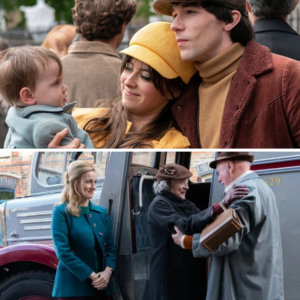In an audacious move that has sent ripples through the entertainment world, Netflix has greenlit a second season for Bookish, a daring new mystery thriller series, before its first season has even premiered. Touted as a blend of the gothic glamour of Bridgerton and the razor-sharp deductive wit of Sherlock, Bookish promises to captivate audiences with its unique fusion of period drama aesthetics and intricate crime-solving narratives. Set in post-war London in 1946, the series follows Gabriel Book, a quirky bookshop owner with an inexplicable gift for solving bizarre murders, portrayed by Emmy Award-winning writer and actor Mark Gatiss. With a stellar cast, including Bridgerton star Polly Walker as Gabriel’s wife Trottie, and a premise that merges high-society elegance with dark, psychological intrigue, Bookish is poised to become Netflix’s next binge-worthy obsession. This article delves into the series’ origins, narrative, cast, thematic depth, production details, and the bold decision to renew it pre-premiere, analyzing whether Bookish lives up to its lofty billing as “Sherlock meets Bridgerton.”
The Premise: A Bookish Detective in a Post-War World
Bookish transports viewers to London in 1946, a city still scarred by the ravages of World War II, where rationing lingers, and the promise of peace is tinged with uncertainty. At the heart of the series is Gabriel Book, played by Mark Gatiss, a former intelligence operative turned bookshop owner whose quiet life masks a preternatural ability to unravel “the strangest of crimes and the knottiest of murders.” The official synopsis paints Gabriel as a man whose wartime espionage experience fuels his knack for detection, with each of the six episodes in Season 1 dedicating two installments to a single, complex mystery. The narrative kicks off when Trottie (Polly Walker), Gabriel’s sharp-witted wife, alerts him to a “suspicious” crime, prompting him to dive into investigations that blend salacious scandal, gory details, and high-stakes intrigue.
The series’ structure, with three distinct mysteries across six episodes, draws heavily from the episodic storytelling of Sherlock, where each case is a self-contained puzzle yet contributes to an overarching character arc. The Bridgerton influence emerges in the lush, period-specific visuals—think opulent costumes, candlelit interiors, and a vibrant post-war social scene—infused with a darker, more gothic tone. Gabriel’s investigations pull him into London’s underbelly, where he collaborates with Inspector Bliss (Elliot Levey) and Sergeant Morris (Blake Harrison), while navigating a web of guest stars, including Daniel Mays, Joely Richardson, and Paul McGann, who add layers of intrigue to each case.
Thematically, Bookish explores the tension between order and chaos in a society rebuilding itself. Gabriel’s gift, described as “no one can explain,” hints at a supernatural or psychological edge, reminiscent of Sherlock Holmes’ uncanny intellect but grounded in the emotional weight of a man haunted by war. The series also delves into gender dynamics, with Trottie’s role as a proactive partner challenging the era’s conventions, much like Bridgerton’s reimagining of Regency-era norms. Early trailers showcase Gabriel’s quip, “Leave nothing out, especially if it’s salacious, gory, or vaguely scandalous,” setting the tone for a series that balances wit with grim stakes.
Origins and Development: A Visionary Blend
Bookish is the brainchild of Mark Gatiss, who not only stars as Gabriel but also created and wrote the series. Known for co-creating Sherlock with Steven Moffat and his work on Doctor Who, Gatiss brings a pedigree of crafting cerebral, genre-bending stories. In an interview with Deadline, Gatiss described Bookish as a response to the “cozy crime” cliché, aiming to infuse the genre with “reckless and life-affirming” energy. The series was developed for Netflix under the UK-based production company Hartswood Films, which also produced Sherlock, ensuring a continuity of quality in writing and production values.
The decision to set Bookish in 1946 was deliberate, allowing Gatiss to explore a transitional period in British history where optimism clashed with lingering trauma. The Bridgerton comparison stems from the series’ attention to period detail—costumes by Pam Downe evoke the tailored elegance of post-war fashion, while production design by Arwel Wyn Jones mirrors the sumptuous interiors of Shondaland’s Regency drama. However, Bookish leans darker, with cinematography by Suzie Lavelle (His Dark Materials) emphasizing moody shadows and fog-laden streets, evoking the noirish atmosphere of 1940s detective stories.
Netflix’s bold move to renew Bookish for a second season before its Season 1 premiere on October 15, 2025, reflects confidence in its potential. Industry insiders speculate that the decision was driven by strong internal screenings, Gatiss’ proven track record, and the global appeal of Bridgerton and Sherlock fanbases. The streamer’s upfront announcement, made during its 2025 fall slate reveal, mirrors its strategy with Bridgerton, which was renewed for Seasons 3 and 4 before Season 2 aired. This preemptive renewal signals Netflix’s belief that Bookish could replicate the cultural phenomenon of its predecessors, blending mass appeal with critical acclaim.
Cast and Characters: A Stellar Ensemble
The cast of Bookish is a major draw, blending veterans and rising stars to create a dynamic ensemble. Mark Gatiss, as Gabriel Book, channels his signature blend of charm and intensity, portraying a detective whose intellectual brilliance is tempered by personal vulnerability. Polly Walker, known for her role as Portia Featherington in Bridgerton, brings a steely elegance to Trottie, a character who evolves from supportive spouse to active collaborator in Gabriel’s investigations. Their chemistry, teased in trailers, promises a partnership that rivals Holmes and Watson, with a romantic undercurrent.
Supporting roles add depth: Elliot Levey’s Inspector Bliss is a pragmatic foil to Gabriel’s eccentricity, while Blake Harrison’s Sergeant Morris injects humor into tense scenes. Buket Kömür plays Nora, a mysterious figure tied to the bookshop, whose backstory hints at wartime secrets. Guest stars like Daniel Mays, Joely Richardson, and Paul McGann appear in pivotal roles, with Mays as a shady nightclub owner and Richardson as a grieving aristocrat, each enhancing the series’ high-society intrigue. Connor Finch, as Jack, a young officer with a surprising connection to Gabriel, adds an element of mystery, with the synopsis teasing that his appointment “wasn’t quite as random as it appears.”
The ensemble’s diversity and talent elevate Bookish beyond typical crime dramas, offering performances that anchor the series’ ambitious narrative. Gatiss has praised the cast’s ability to “breathe life into the period while making it feel urgent and modern,” a balance that aligns with the Sherlock–Bridgerton fusion.
Thematic Depth: Crime, Society, and the Human Psyche
Bookish stands out for its thematic ambition, weaving together crime-solving with reflections on post-war society, trauma, and morality. Gabriel’s gift, while central to the plot, serves as a metaphor for the struggle to find meaning in a fractured world. His wartime past, hinted at in flashbacks, suggests a man grappling with guilt and loss, paralleling Sherlock’s exploration of Holmes’ emotional isolation. The series’ mysteries—ranging from ritualistic murders to blackmail schemes—probe the darker corners of human behavior, echoing Bridgerton’s fascination with scandal but grounding it in psychological realism.
Gender dynamics play a significant role, with Trottie and Nora challenging the era’s patriarchal norms. Unlike Bridgerton’s romantic focus, Bookish uses its female characters to explore agency and resilience, particularly in Trottie’s transformation into a detective in her own right. The series also critiques the justice system, with Gabriel’s unorthodox methods raising questions about whether legal or vigilante justice better serves victims—a theme resonant with contemporary debates.
The gothic glamour promised in the series’ marketing is evident in its visual and narrative tone. The bookshop, a labyrinthine space filled with rare tomes, serves as a symbolic hub for Gabriel’s investigations, blending cozy intellectualism with eerie undertones. Each case, described as “complex and layered,” draws on classic detective tropes while incorporating modern psychological insights, making Bookish a bridge between traditional whodunits and contemporary thrillers.
Production Values: A Visual and Auditory Feast
Bookish’s production values are a testament to Netflix’s investment in high-quality period dramas. The series’ 1946 setting is brought to life through meticulous costume and set design, with tailored suits and elegant dresses juxtaposed against London’s bombed-out streets. The cinematography, with its muted color palette and stark contrasts, evokes the gritty realism of film noir while retaining Bridgerton’s polished aesthetic. The score, composed by Murray Gold (Doctor Who), blends orchestral grandeur with haunting motifs, amplifying the series’ emotional and suspenseful beats.
Filming took place in London and Bristol, with historic locations like the Georgian House Museum and Tobacco Factory transformed into post-war settings. The production faced challenges due to the need for period accuracy, but Gatiss noted in a Radio Times interview that the team’s commitment to authenticity created a “world you can lose yourself in.” The attention to detail, from ration-book props to vintage vehicles, immerses viewers in a time of scarcity and hope, setting Bookish apart from its flashier contemporaries.
Reception and Expectations: A Risky Bet?
While Bookish has yet to premiere, early buzz from industry screenings and trailers suggests a polarized reception is possible. Critics who viewed rough cuts at Netflix’s 2025 upfronts praised the series’ ambition and cast but cautioned that its dense plotting might alienate casual viewers. Variety called it “a bold swing that could either dazzle or confound,” noting Gatiss’ ability to craft “wit-soaked dialogue” but questioning the pacing of the two-episode-per-case structure. The Hollywood Reporter highlighted the Bridgerton connection, predicting that Walker’s presence and the period glamour could draw romance fans, while Sherlock enthusiasts might embrace the cerebral mysteries.
Audience anticipation is high, fueled by Netflix’s marketing campaign, which includes a trailer showcasing Gabriel’s quippy deductions and Trottie’s fierce resolve. Social media reactions on X have been enthusiastic, with fans of Gatiss and Bridgerton expressing excitement over the “gothic detective vibe.” However, some posts express skepticism about the Sherlock comparison, given the latter’s divisive final seasons. The pre-premiere renewal has sparked debate, with some praising Netflix’s confidence and others questioning the risk of committing to a second season without audience feedback.
Comparisons to Sherlock and Bridgerton are both a blessing and a curse. Sherlock’s 83% Rotten Tomatoes score and global fanbase set a high bar, but its later seasons were criticized for convoluted plots, a potential warning for Bookish. Bridgerton’s success, with Seasons 1 and 3 ranking among Netflix’s most-watched series, raises expectations for visual splendor, but Bookish’s darker tone may not appeal to all romance fans. The series’ ability to balance these influences while carving its own identity will be key to its success.
The Renewal Gamble: Why Before Premiere?
Netflix’s decision to renew Bookish for Season 2 before its October 15, 2025, premiere is a strategic gamble rooted in several factors. First, Mark Gatiss’ track record with Sherlock and Dracula assures a built-in audience, particularly in the UK and US, where his work enjoys cult status. Second, the Bridgerton connection, amplified by Polly Walker’s casting, taps into a massive global fanbase, with Seasons 1 and 3 ranking #5 and #7 on Netflix’s all-time English-language series list. Third, the crime thriller genre remains a streaming staple, with hits like Your Honor and The Undoing proving audiences crave high-stakes mysteries.
The renewal also reflects Netflix’s long-term investment in serialized storytelling. By committing to multiple seasons, the streamer ensures narrative continuity, allowing Gatiss to plant seeds for future mysteries. Industry analysts suggest the decision was bolstered by strong test screenings, with internal data showing high engagement among viewers aged 18-45, a key demographic for both Sherlock and Bridgerton. The move mirrors Netflix’s strategy with Stranger Things and The Witcher, where early renewals built hype and loyalty.
However, the risk is notable. If Season 1 underperforms or fails to capture the Sherlock–Bridgerton magic, the early renewal could backfire, drawing comparisons to premature renewals like Jupiter’s Legacy, which was canceled after one season despite initial confidence. Bookish’s success will hinge on its ability to deliver compelling mysteries and character-driven drama, avoiding the pitfalls of Sherlock’s later seasons.
Place in the Crime Thriller Landscape
Bookish enters a crowded field of crime thrillers, competing with 2025 releases like Untamed, a Yosemite-set mystery starring Eric Bana, and The Breakthrough, a Swedish detective series. Its period setting and Bridgerton-esque flair set it apart from modern procedurals, while its psychological depth aligns with Mindhunter and Hannibal. Unlike Sherlock, which modernized Holmes, Bookish embraces a historical context, making it a closer cousin to The Alienist or Penny Dreadful. Its focus on a bookshop owner rather than a traditional detective adds a fresh angle, appealing to fans of cozy mysteries like Pushing Daisies while retaining a darker edge.
The series’ gothic glamour and witty dialogue position it as a hybrid, potentially attracting viewers who enjoyed Bridgerton’s romance and Sherlock’s puzzles. Its exploration of post-war trauma and societal change offers timely resonance, reflecting contemporary anxieties about justice and recovery. However, it must avoid the narrative bloat that plagued Sherlock’s later seasons to maintain viewer investment.
Conclusion: A Binge-Worthy Experiment?
Bookish is a bold experiment, blending the opulent visuals of Bridgerton with the cerebral sleuthing of Sherlock in a post-war setting that promises both glamour and grit. Mark Gatiss’ vision, backed by a stellar cast and Netflix’s audacious renewal, positions the series as a potential cultural touchstone. Its success will depend on its ability to balance intricate mysteries with compelling character arcs, delivering the “next TV obsession” promised by its marketing.
For fans of Sherlock, Bookish offers the sharp wit and deductive thrills they crave, while Bridgerton devotees will find allure in its period aesthetics and romantic undertones. Yet, the series’ darker tone and complex plotting may challenge casual viewers, requiring patience to unravel its mysteries. As it prepares to premiere on October 15, 2025, Bookish stands at a crossroads: a groundbreaking fusion of genres or an ambitious overreach. With Season 2 already secured, it’s a safe bet that Netflix believes in its potential to redefine the crime thriller landscape. Grab your deerstalker and lace gloves—this is one mystery worth investigating.




